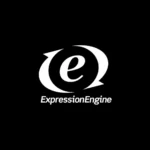We’re exploring the five best alternatives to ExpressionEngine, the popular content management system used by thousands of websites and many desktop web apps. ExpressionEngine is used by many organizations, but it may not always fit their needs or budget.
Explore the Top ExpressionEngine Alternatives
We hope to help you gain an understanding of when ExpressionEngine might be right for your organization’s new website, and to help you get to know the leading alternatives.
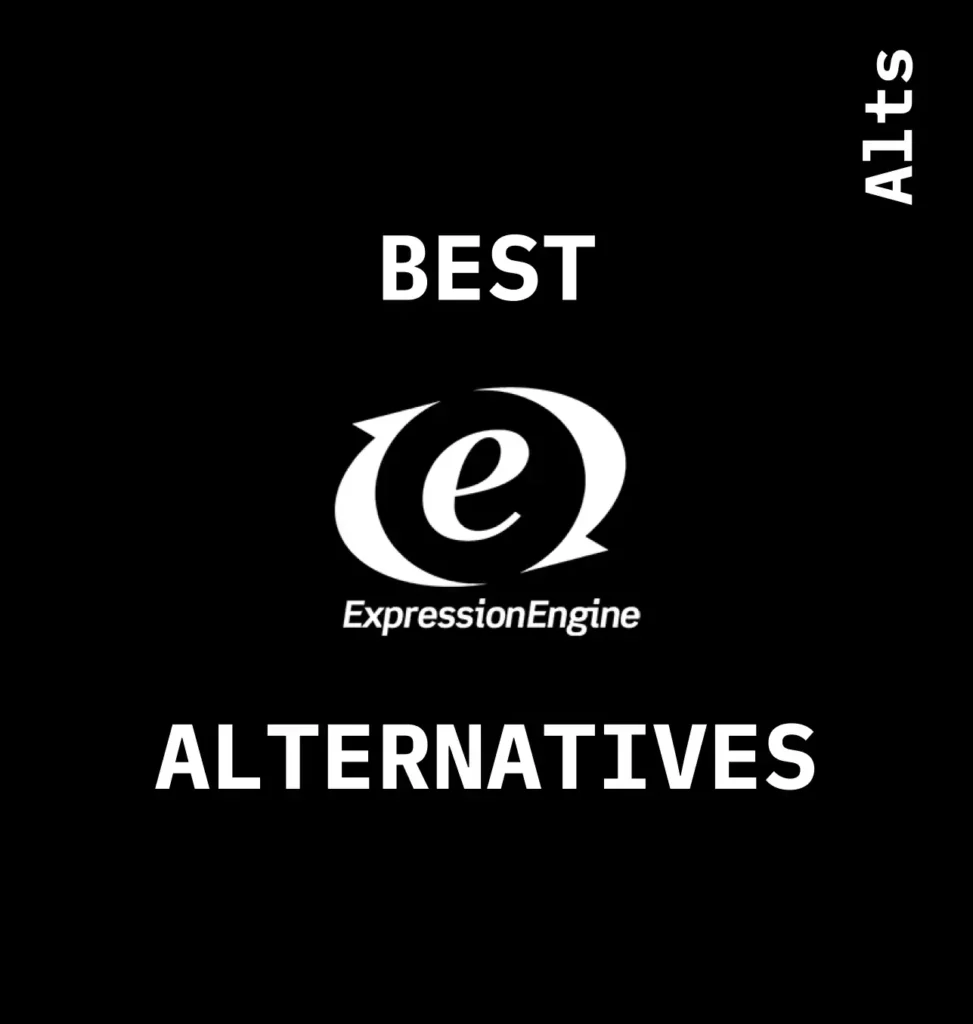
ExpressionEngine is a simple content management system created by EllisLab, Inc. It allows users to easily manage website content and create web applications using simple templates. EllisLab also previously maintained CodeIgniter, now maintained by the British Columbia Institute of Technology.
The History of ExpressionEngine
ExpressionEngine was released in 2003 or 2004 as a commercial-grade CMS. It is based on the CodeIgniter PHP framework and has been compared to WordPress for its flexibility, scalability, and ease of use. When first released, the system was used for small business websites and personal blogs.
Today, many larger organizations, including the United Nations and major media outlets such as the New York Times, use ExpressionEngine to power their websites.
Rebrand to EE
Around 2016, ExpressionEngine was rebranded as “EE” and the company started to focus more heavily on building an ecosystem of products to expand the impact of their flagship CMS. Between 2016 and 2019, ExpressionEngine traded hands several times, and the goals, mission, and team has shifted often.
Challenges in 2024 with EE
Some organizations on Reddit are reporting challenges with newer versions of ExpressionEngine, including a lack of support for older versions and issues with documentation not being kept up to date when new features are added. Others have faced issues of slow page loading times, broken themes, limited caching management options, and generally larger sites report feeling they’ve outgrown the platform and the ecosystem.
Thankfully, there are plenty of options available that can provide similar features at an affordable price point. Here’s an overview of each of the top EE alternatives, including their respective features and strengths, so that you can decide which is right for your organization’s needs.
1. WordPress

WordPress is an open-source content management system that powers over 40% of the websites on the internet today. It is literally used by millions or organizations.

ExpressionEngine vs WordPress
Everyone likes WordPress because it is incredibly user friendly and versatile. With it, organizations can create beautiful websites without having to write any code at all.
WordPress is easy to install, set up and manage from one dashboard, with a range of free and premium themes available for customizing your site’s look. The platform also provides powerful plugins that can be used to extend functionality further still – from eCommerce tools like WooCommerce, membership plugins such as Memberful, and marketing tools like OptinMonster.
- ExpressionEngine is complicated, but perhaps more scalable.
- WordPress is more comprehensive for functionality vs EE, with so many plugins.
- ExpressionEngine’s theming is limited, more required custom development compared to WordPress.
When it comes down to it, comparing ExpressionEngine vs WordPress is more involved, as the two are very popular and both could be useful solutions for your organization’s new website.
What’s more? WordPress offers thousands of plugins developed by third party developers which can be used for a variety of purposes such as SEO optimization, security enhancements or even adding new features like chatbots or social media integration into your website!
Plus, everyone loves how WordPress offers support forums where you can get help if needed; a huge community of WordPress developers, engineers, and educators all cooperating to make this open source project successful, and the migration from Expression Engine to WordPress as easy as possible. All in all, it’s an excellent choice for those looking for a comprehensive CMS solution with no coding skills required.
2. Craft CMS
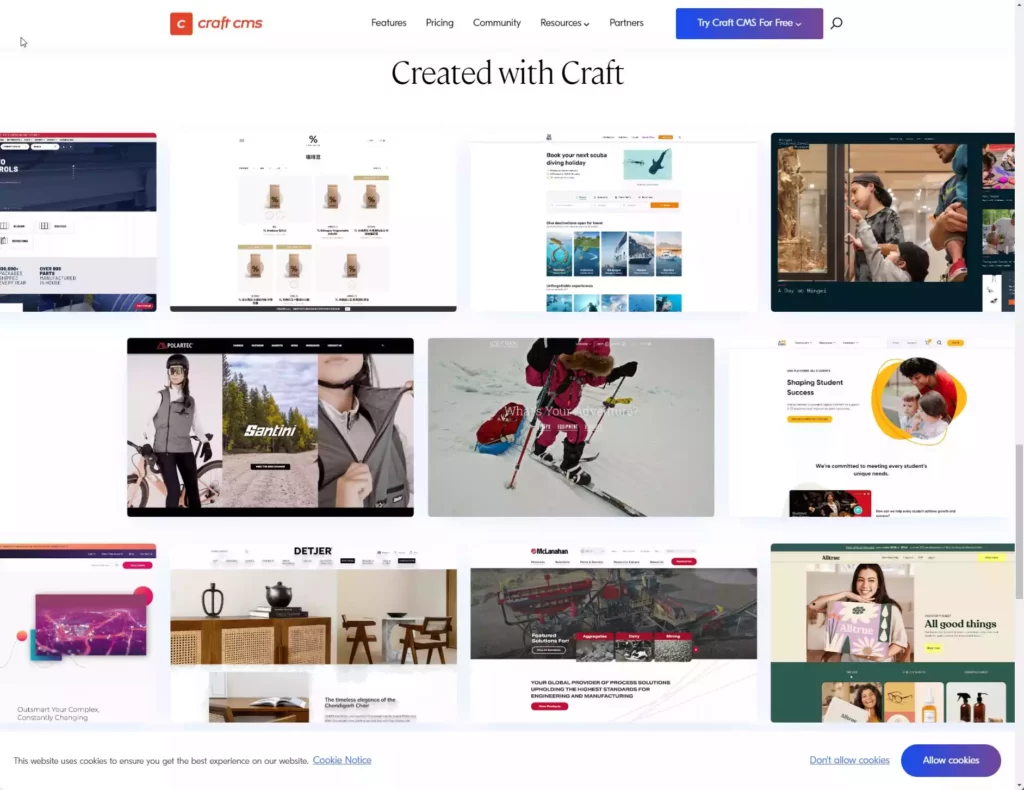

Craft CMS is one of the most popular open source content management systems for web developers today thanks to its customizability and flexibility. It’s also easy to use with intuitive navigation tools and a vast library of plugins from third-party providers that extend functionality further still.
Craft is touted as one of the most powerful and user-friendly open source publishing platforms on offer today with its range of customizable templates and modules making it “ideal for creating complex websites quickly.”

Craft is a content management system that provides everything developers need, while also being secure and supported.
Craft CMS vs ExpressionEngine
In general, the two CMS’ are quite similar. Moreso than we expected. Although Craft is relatively new, it has already amassed a good following and community.
- Craft is being adopted by leading teams like IDEO, Netflix, IKEA, and a lot of other big organizations.
- ExpressionEngine is, for many of those teams, their legecy system.
- New development within the EE ecosystem is dwindling, while Craft CMS seems to be heating up.
It has integration capabilities with marketing tools such as Salesforce and Mailchimp, localization services for an unlimited number of sites in multiple languages, an internationalized admin panel translated into 25 languages, authors’ ascend feature to give them a user-friendly authoring experience, scalability to fit any business size or type from small portfolios to large multinational companies, and access to the worldwide Craft community for support.
3. October CMS
October is a powerful open-source platform that has been steadily growing in popularity since its launch back in 2014.

October CMS is an open-source content management system that was engineered to be easy for developers and users. It is built on Laravel, the best PHP framework available, and includes all of the necessary tools and classes to create amazing websites.
Its easy-to-use drag & drop interface makes creating complex websites quick and intuitive, while the ‘theme engine’ feature allows users to quickly switch between different designs without having to start from scratch each time you need an update!
October CMS vs ExpressionEngine
Overall, both platforms offer a reasonable development ecosystem.
“We moved the component-based RAD (rapid application development) concept to the web and implemented it as a flat-file CMS.” explains Alexey Bobkov, co-founder of October CMS. “The configuration section of October CMS pages uses the INI format. The INI format is an ancient technology; I believe it’s at least 30 years old. Thus, we took several really old ideas and mixed them with the best and newest technology in the PHP world – Laravel.”
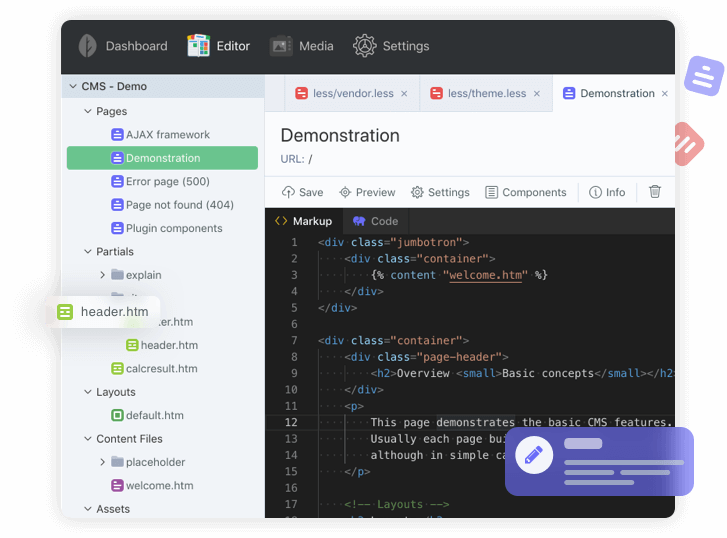
October CMS allows developers to build pages quickly with components and its simple template engine (Twig). The platform also offers a code editor, compatibility with Composer package manager, asset combiner for reduced page load times/server traffic, multisite feature for multiple languages support as well as Tailor – a tool which automatically creates content types from YAML files.
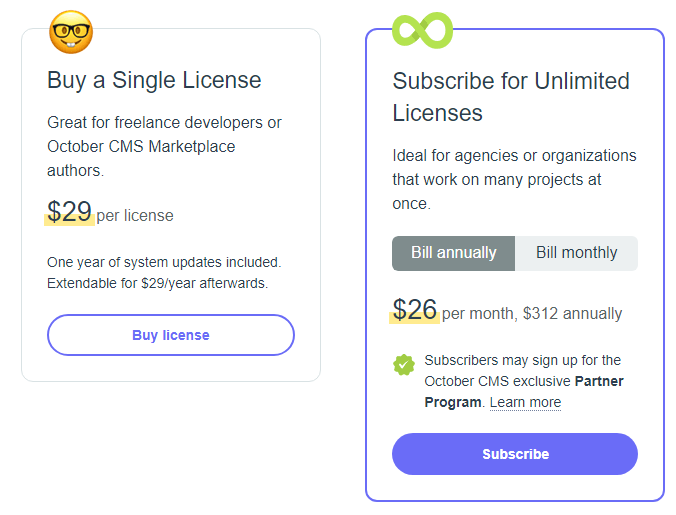
“October CMS is perfect for website and web application developers familiar with Laravel.” offers Bobkov. “If you have web development projects with tight deadlines and a lot of custom requirements, October CMS is the best fit.”
4. Webflow

Webflow is a website building and CMS platform, like EE, that offers both developers and non-technical users the tools they need to create interactive websites. Webflow’s simple drag-and-drop interface allows anyone to build beautiful, responsive sites without having to write any code at all.
In 2015, Webflow was voted the top web design tool by readers of the popular Smashing Magazine. And in 2022 Webflow was named to the Forbes 2022 Cloud 100, the definitive ranking of the top 100 private cloud companies in the world, published by Forbes in partnership with Bessemer Venture Partners and Salesforce Ventures. Webflow was recognized as the #50 company on the list, up from #69 in 2021 and #95 in 2020
The platform comes with dozens of templates designed by professionals which can be easily customized or built from scratch with its intuitive visual designer tool.
“Webflow enables people to build websites visually, saving engineering time, while clean code seamlessly generates in the background. From independent designers and creative agencies to Fortune 500 companies, millions worldwide use Webflow to be more nimble” explains the Webflow team. “Webflow powers websites for innovative companies like Zendesk, Lattice, Getaround, Upwork, Allianz, and Dell.”

Other features include custom coding options, video backgrounds for engaging visuals, support for multiple languages (including Chinese), integration with third party services such as Dropbox and Google Drive, real time previews of changes made in the editor mode so you can quickly see how your site will look, and more.
Founded in 2013 and based in San Francisco, Webflow is backed by Accel, CapitalG, Silversmith Capital Partners, Y-Combinator, and Draper Associates.
Deciding on an EE alternative
This article explores the best alternatives to ExpressionEngine in 2023. We’ve discussed WordPress, Craft CMS, October CMS, and Webflow – and explained why they are all excellent choices for those looking make the switch from ExpressionEngine.
It’s important to remember that no one CMS is perfect for everyone, and the best choice for you will depend on your individual needs. Take time to research each platform thoroughly, assess the features and functionality offered by each solution, evaluate their pricing models and customer service options, review any available user feedback from real customers or reviewers online, consider any relevant support forums related to each platform – then make an informed decision about which alternative is right for you.
We hope these resources can help you as you consider alternatives to ExpressionEngine and explore options for migrating your website from ExpressionEngine to WordPress, CraftCMS, or whichever platform you decide is right for your organization.

